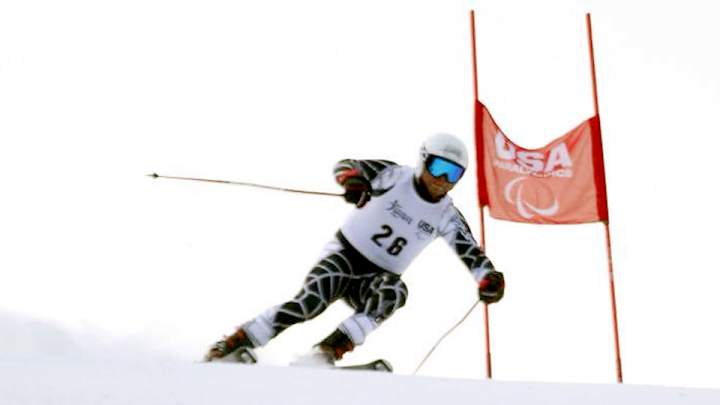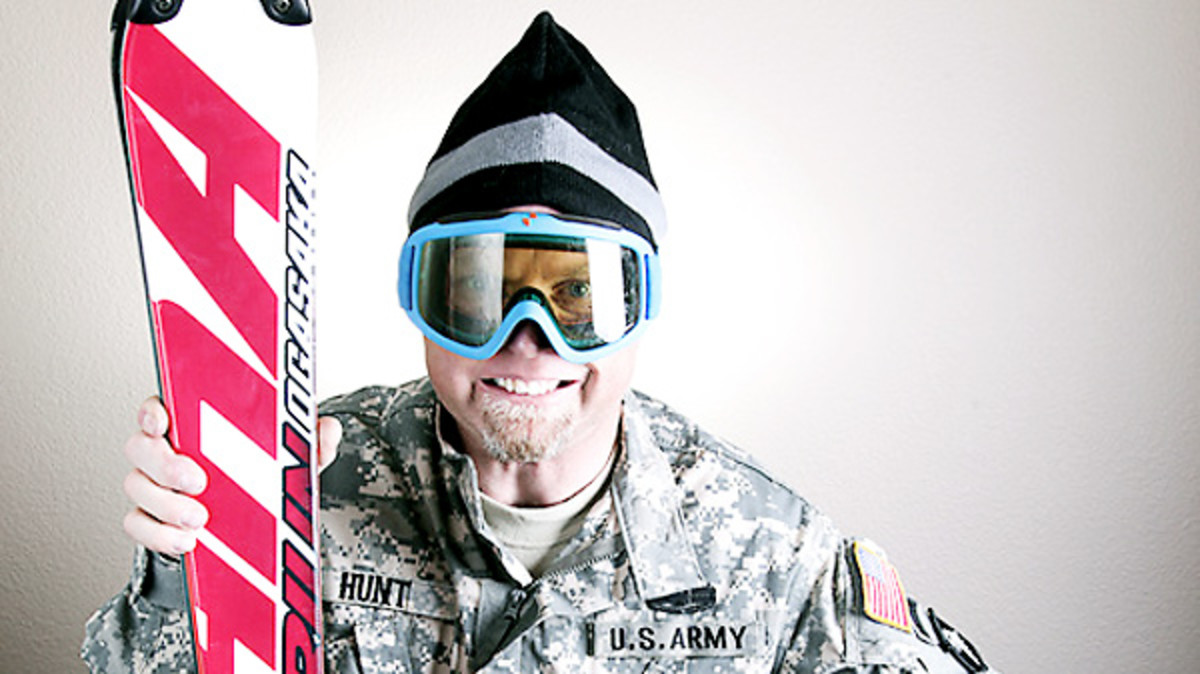Learning to cope: Disabled vet Hunt finds freedom as Paralympic skier

In November of 2012, Joel Hunt sorted through his deceased mother’s possessions. There were piles to organize, memories to distill from junk, and in the middle of the chaos, Hunt found a wad of money.
It sat heavy in his hands. The paper enclosed marked its purpose. Russia, it read.
Telling the story now, for the umpteenth time and more than a year later, Hunt is still reduced to tears. He wheezes a bit as his voice -- the cadence slower, clearer now than it has been in years -- cracks. Joel Hunt is going to Russia, as a member of the U.S. ski team for the Paralympic Games in March, and he’s doing it for his mother.
It’s been seven years since Hunt returned from his third tour of duty in Iraq, disabled and feeling as if he had no purpose. A roadside blast left him with a traumatic brain injury, double vision, a left leg paralyzed from the knee down and a severe case of post-traumatic stress disorder. He was confined to a wheelchair, downing 15 medications each day. He was constantly dizzy, would overheat at a moment’s notice. When he spoke, his words slurred.
To talk to Hunt today is to find a different man. The 35-year-old’s words are pronounced, intentional, as if he’s pacing himself in his mind. The medications are nearly gone, down to three pills a day, and the wheelchair went by the wayside years ago. The double vision remains, and his leg still drags a bit, but none of that has stopped him from reaching the goal he unwittingly set out toward more than five years ago.
Hunt’s story before skiing is one that’s all too common among soldiers who spent time in Iraq. There are regrets: not going to college, selling himself short. There’s a marriage hastily entered and gradually dismembered. There are parents who thought their work was done, who had to watch their child feel aimless and purposeless, who found ways to cope with the fact that he’s dealing with PTSD and thoughts of suicide. There’s a lack of adequate benefits and a struggle for help.
What’s less common: This story has a happy ending.

When Hunt’s mother, Judy, passed away in 2012, he had been skiing for years, ever since his parents pushed him into an adaptive program in the Rocky Mountains just west of Denver, where he lived at the time. They knew he needed some kind of activity to pass his time. Why not ski?
Even so, Hunt was no ace, at least not initially. On one of his first days on the mountain, he asked an instructor if he could become a talented racer. He’d caught on quickly, the instructor observed, but he told Hunt no. He was too debilitated, and, pushing 30 at the time, too old.
Hunt doesn’t take kindly to doubt. In his first year skiing, 2008, he estimates he spent 125 days on the slopes and put 80,000 miles on his truck driving back and forth from Denver.
Quickly, he learned the limitations of his disability and how to minimize them. For instance, navigating around gates can be tough. Hunt sees three when there is only one, but he knows the least-blurry, middle image is the right one. Controlling his left leg is similarly difficult.
“I have to hope that my foot is going the right direction,” Hunt said. “With my thigh muscle, I’m trying to push the knee down. The best way to describe it is if you put ski boots on and go and try and drive a vehicle. You know you’re putting something down, but you don’t know how hard.”
There is an almost reckless nature to Hunt’s skiing, in part due to his disability and in part to the exuberance with which he embraces the sport. A few winters ago, on Hunt’s first day at a racing camp in Winter Park, Colo., Jon Lujan was supposed to be monitoring him. Lujan, a fellow veteran who will also compete in Sochi, didn’t quite realize what he was in for.
“Getting off the chair, he took off like a rocket, straight-lining it down the hill, never turning, and (he) proceeded to run into a snowboarder, and both went tumbling down,” Lujan recalled. “I skied up and explained to the snowboarder that it was my fault, and I was supposed to be making sure that Joel was in control. Well, the guy wanted to fight us -- until I told him we were both vets and to bring it on.”
Hunt will admit to a certain abandon when it comes to skiing, but for him, it’s all tied up in the concept of freedom. Skiing frees him, and in that, it saved him. It assured him he wouldn’t be codependent for the rest of his life. It gave him a purpose, a platform.
“I felt free as a bird,” Hunt said. “I felt that nobody could touch me, and I was all by myself, and I could feel the wind through my face. I’m not depending on anybody. I’m my own person.”
Jonathan Mika, the U.S. Paralympic skiing team coach and one of Hunt’s instructors at the Aspen Valley Ski and Snowboard Club, where he trains for much of the year, is no stranger to dealing with disabled veterans. He has several on his adaptive skiing team in Aspen, and the group shares a common bond.
When discharged, most felt as if they’d lost their chance to serve their country, and now, as one of 18 veterans competing in Sochi, Hunt has gotten that opportunity back in a big way. He looks at skiing as a platform for his message, and he has his speech for struggling veterans down to a fine art. The gist: I overcame all this, and so can you.
GALLERY: U.S. Paralympic sled hockey goalie Steve Cash
That’s not to say Hunt is cured. His physical disabilities will persist, and mentally, he still has his bad days. His emotions bubble a bit closer to the surface than most people’s, and the darkness that plagued him in his first days back from Iraq is never distant.
PTSD is like “drinking nine Red Bulls and eating nine Snickers,” he said. “It gets you on fight mode every minute of the day, to the point where you can’t sleep, you can’t do anything, and you’re thinking to yourself, I don’t want to live like this.”
When Hunt had those thoughts in the past, he had little to do but sit in his wheelchair and brood. Now, he skis, and it makes all the difference.
The Paralympics, by definition, are meant for athletes with physical, not mental, disabilities. Athletes with traumatic brain injuries are often not considered for the games, and Hunt’s PTSD is also certainly a mental affliction. In many ways, he has more to overcome than the bulk of the athletes he competes against. But one would never know it, and Mika and the other instructors make an effort to treat Hunt like any other able-bodied skier.
“Our philosophy is to not really tweak our philosophy at we all,” Mika said. “We try to act and treat these guys like there’s nothing wrong with them.”
Hunt will arrive in Sochi in early March. When his feet -- the good one and the bad one -- touch Russian soil, he’ll have accomplished the goal his mother set out for him, the goal she put aside those bills to watch unfold. Win or lose, he made it, and he says he’ll be happy either way. He knows how far he’s come. He feels it every morning when he wakes up and his body aches in a hundred thousand ways, when he decides to face the day instead of retreat.
Seven years ago, Hunt was scared for what life might hold for him. He hasn’t quite kicked that fear, and he still worries what will happen when he’s 60 years old and can no longer ski. Still, he’s transferred those worries into sport, into something exhilarating, something he can control.
“Every single time I get on the starting gate and I push out, I’m scared every time,” he said.
He pauses.
“And then you ski, and you’re like, ‘S***, I can’t believe I just did that.’”
SMORODINSKAYA: Sochi Paralympics failing to meet London standard
